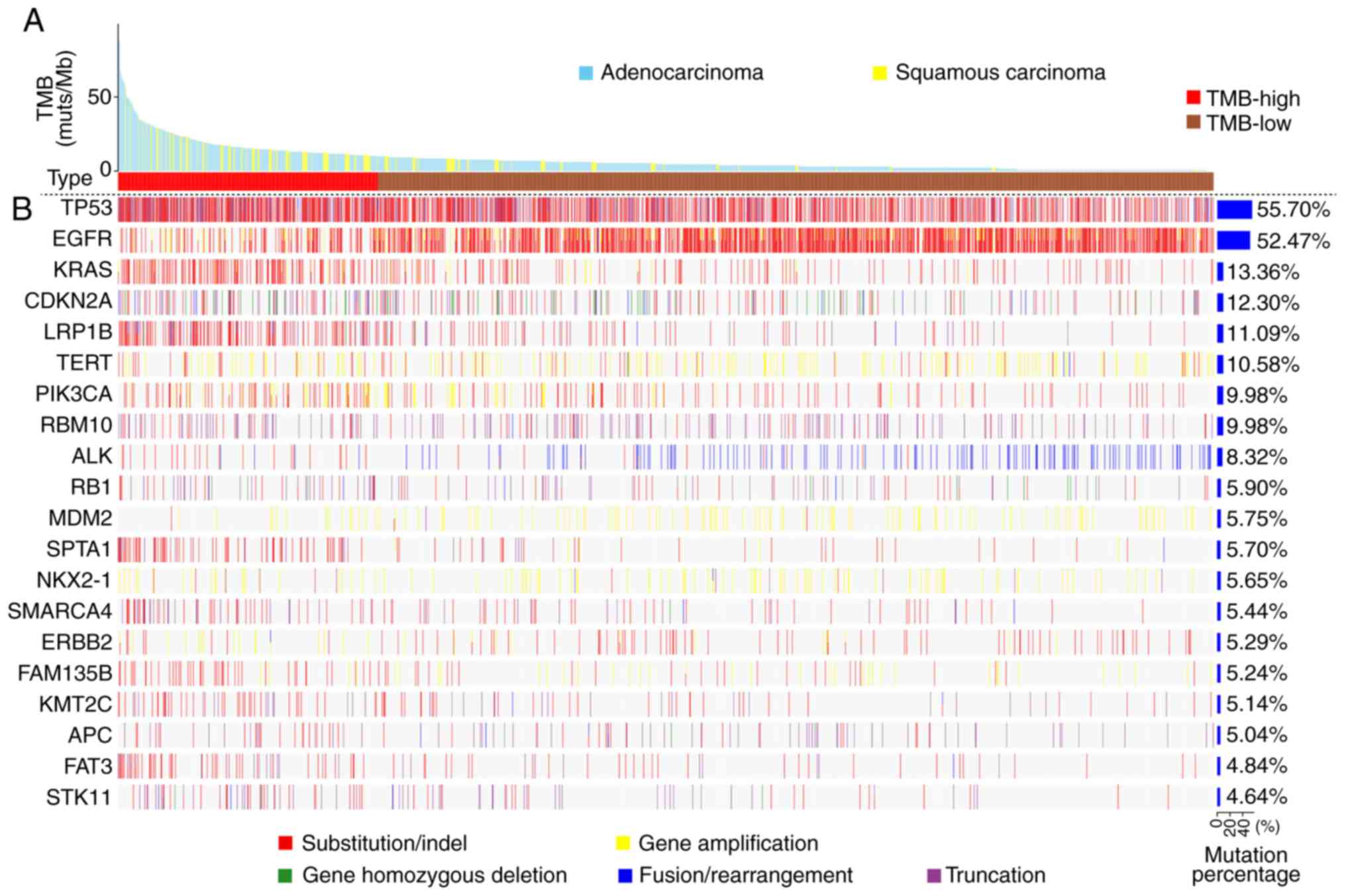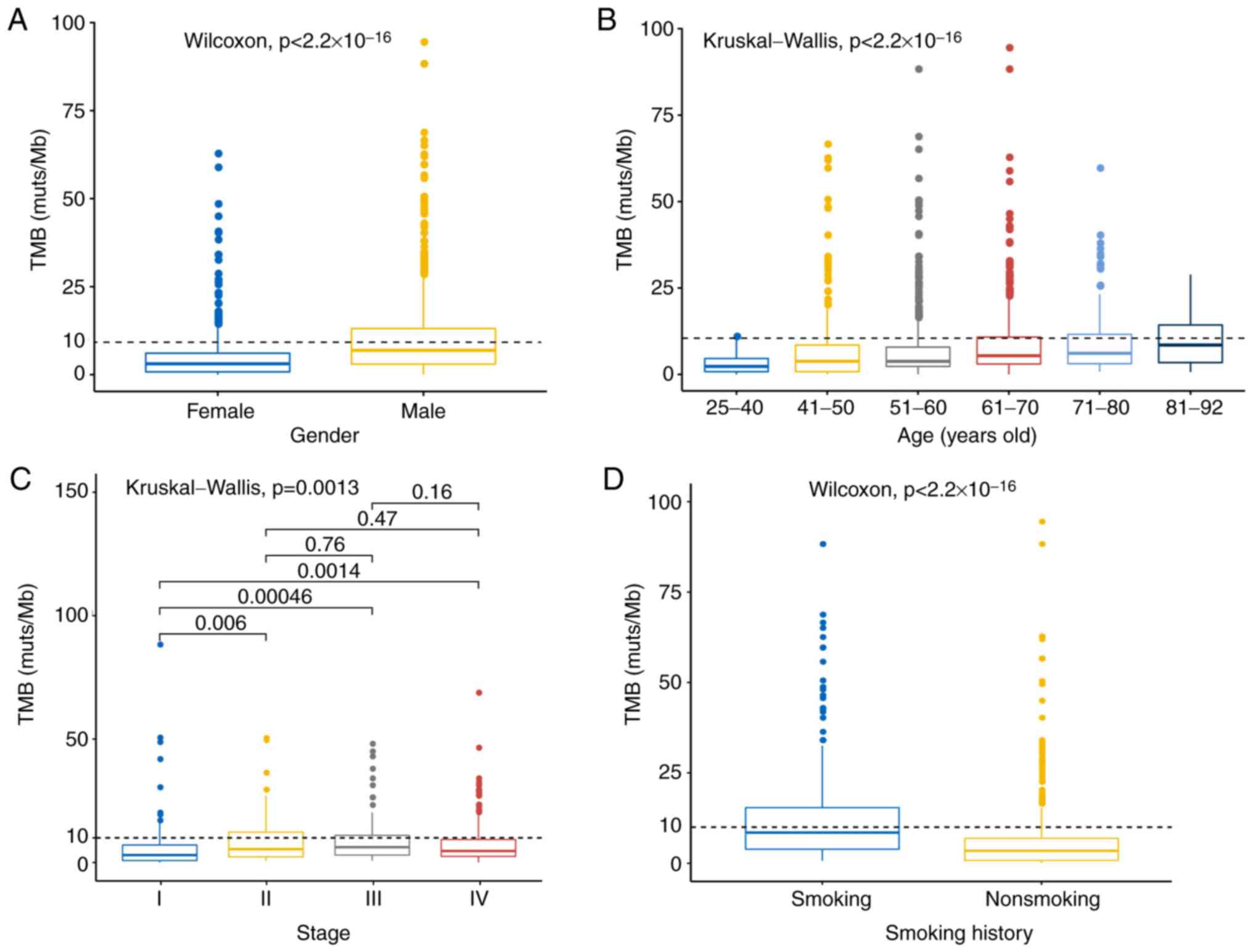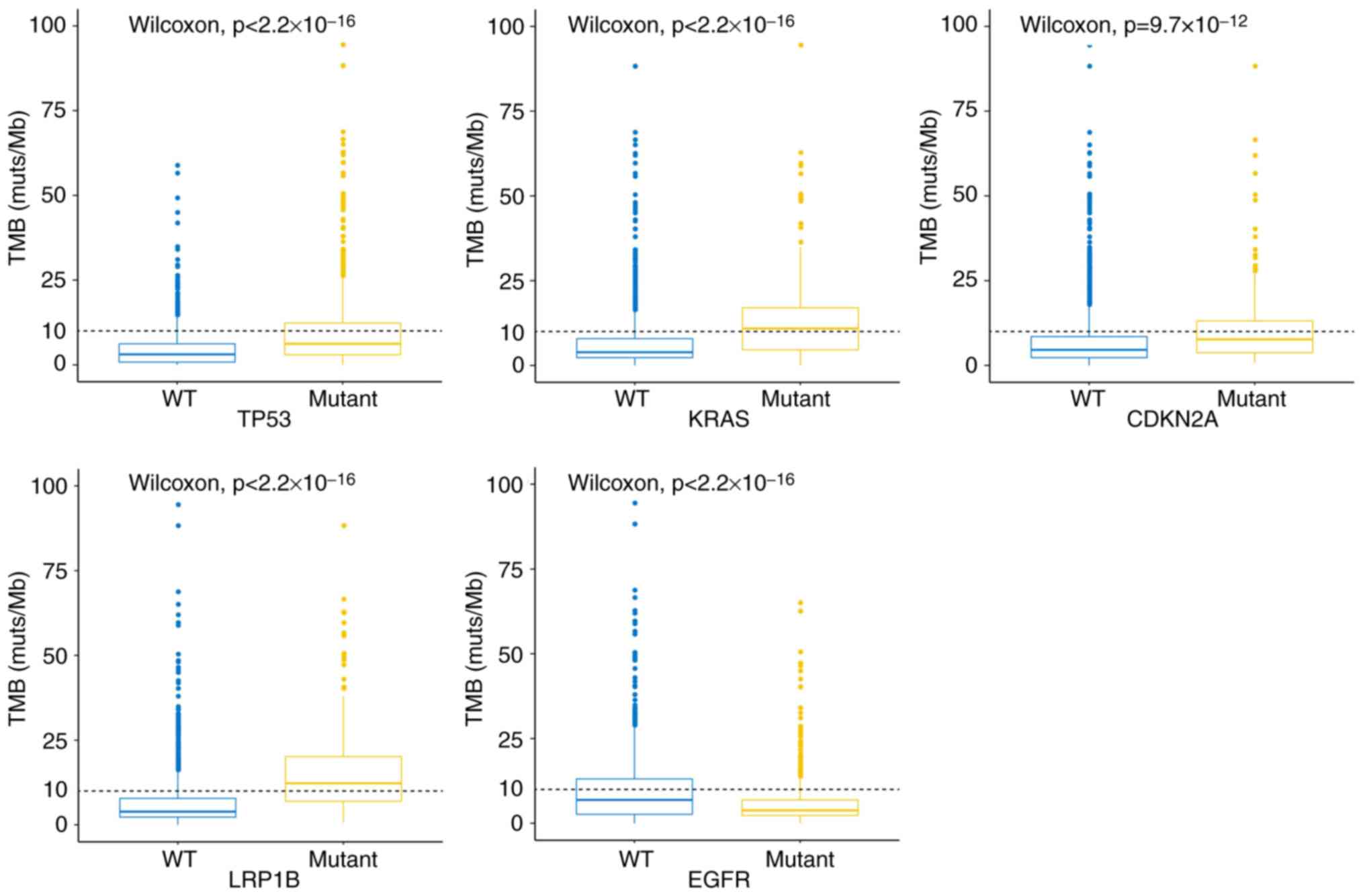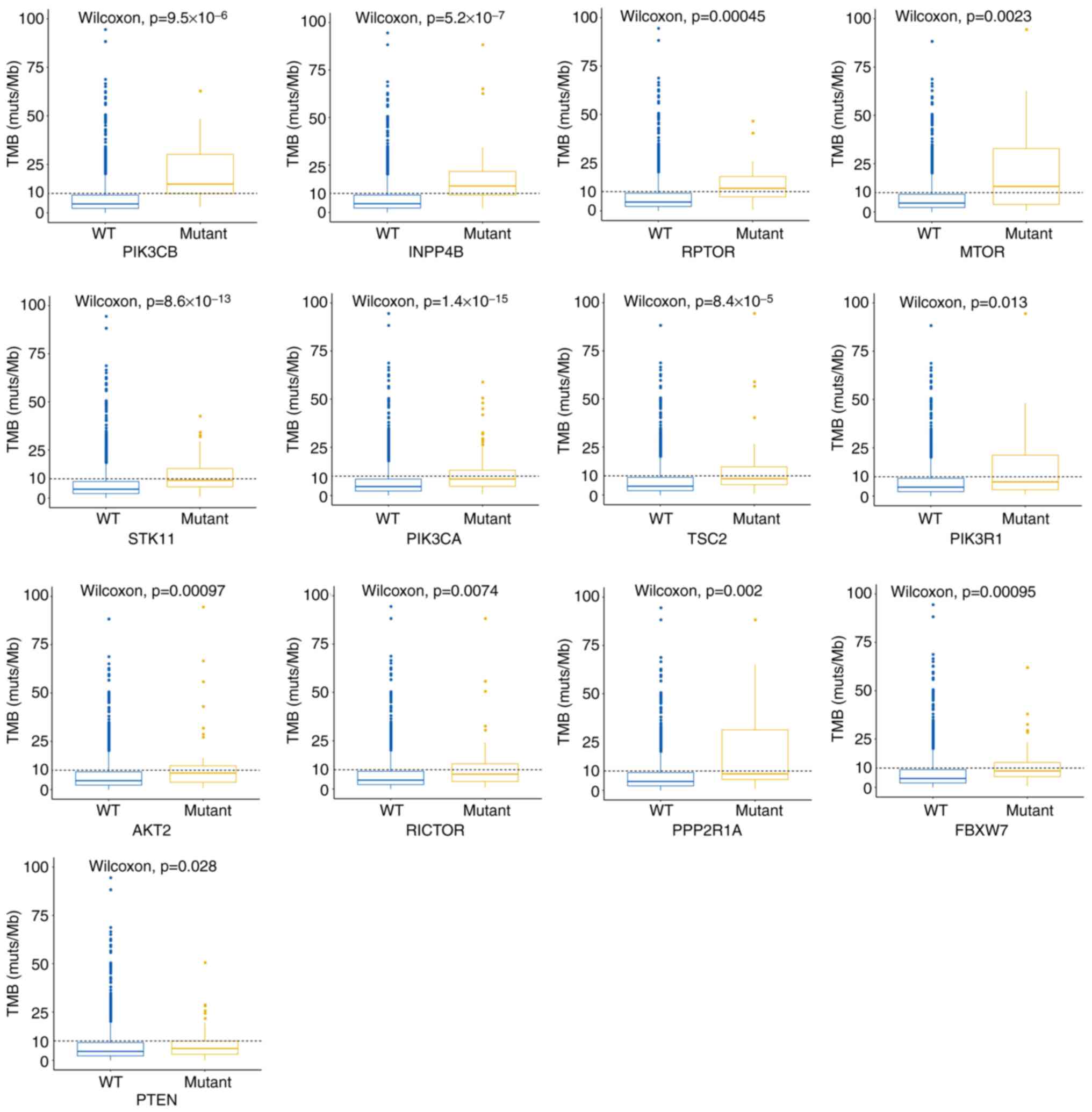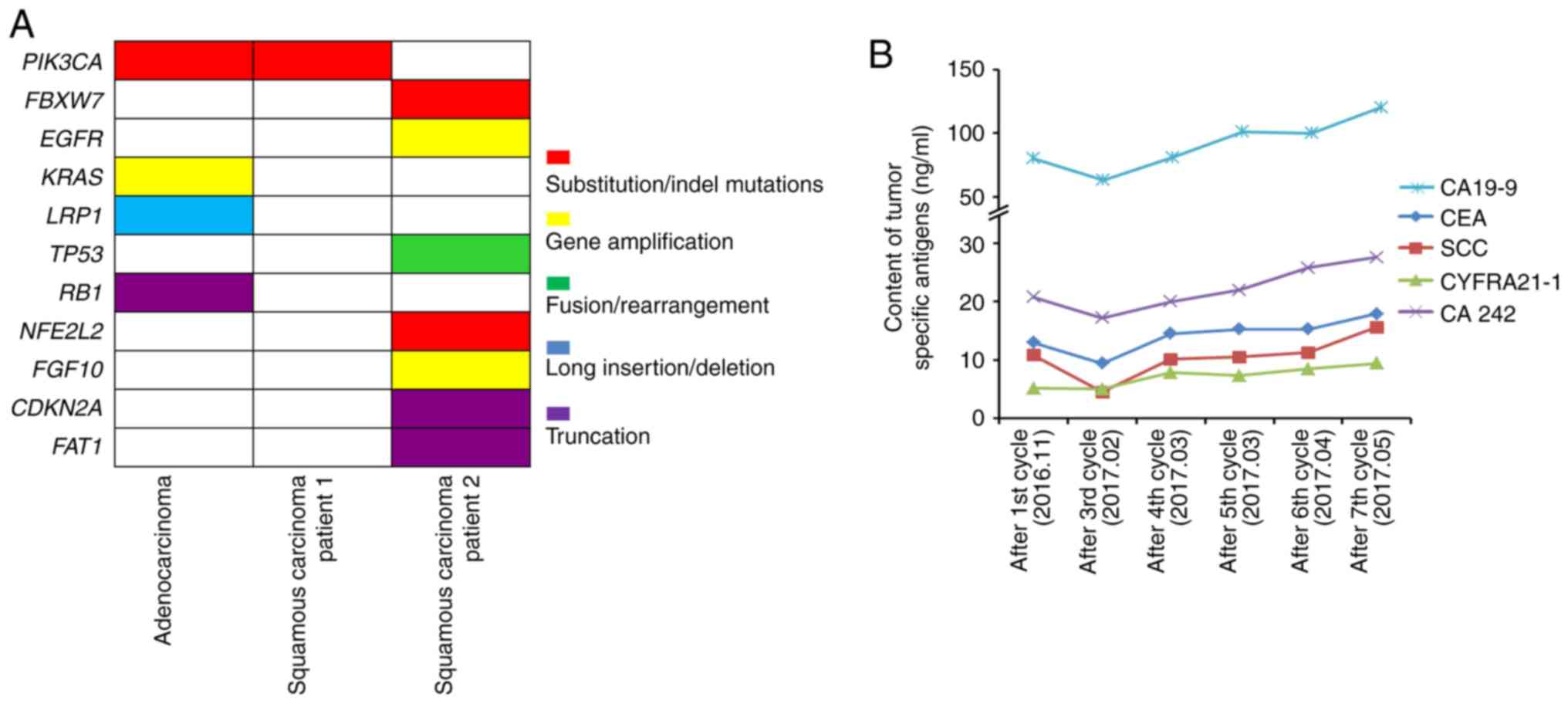|
1
|
Linnoila I: Pathology of non-small cell
lung cancer. New diagnostic approaches. Hematol Oncol Clin North
Am. 4:1027–1051. 1990.
|
|
2
|
Nemunaitis J, Papai Z, Léna H, Losonczy G,
Forget F, Chouaid C, Szczesna A, Gervais R, Ottensmeier CH, Beck J,
et al: TG4010 immunotherapy plus chemotherapy as first-line
treatment of advanced non small cell lung cancer (NSCLC): Phase IIb
results of the TIME trial. J Immunother Cancer. 3 (Suppl
2):P4412015. View Article : Google Scholar :
|
|
3
|
Rolfo C, Caglevic C, Santarpia M, Araujo
A, Giovannetti E, Gallardo CD, Pauwels P and Mahave M:
Immunotherapy in NSCLC: A promising and revolutionary weapon. Adv
Exp Med Biol. 995:97–125. 2017. View Article : Google Scholar
|
|
4
|
Mahoney KM, Freeman GJ and McDermott DF:
The next immune-checkpoint inhibitors: PD-1/PD-L1 blockade in
melanoma. Clin Ther. 37:764–782. 2015. View Article : Google Scholar :
|
|
5
|
Hamanishi J, Mandai M, Matsumura N, Abiko
K, Baba T and Konishi I: PD-1/PD-L1 blockade in cancer treatment:
Perspectives and issues. Int J Clin Oncol. 21:462–473. 2016.
View Article : Google Scholar :
|
|
6
|
Teo MY, Seier K, Ostrovnaya I, Regazzi AM,
Kania BE, Moran MM, Cipolla CK, Bluth MJ, Chaim J, Al-Ahmadie H, et
al: Alterations in DNA damage response and repair genes as
potential marker of clinical benefit from PD-1/PD-L1 blockade in
advanced urothelial cancers. J Clin Oncol. 36:1685–1694. 2018.
View Article : Google Scholar :
|
|
7
|
Jia L, Zhang Q and Zhang R: PD-1/PD-L1
pathway blockade works as an effective and practical therapy for
cancer immunotherapy. Cancer Biol Med. 15:116–123. 2018. View Article : Google Scholar :
|
|
8
|
Alexandrov LB, Nik-Zainal S, Wedge DC,
Aparicio SA, Behjati S, Biankin AV, Bignell GR, Bolli N, Borg A,
Børresen-Dale AL, et al: Signatures of mutational processes in
human cancer. Nature. 500:415–421. 2013. View Article : Google Scholar :
|
|
9
|
Cantley LC: The phosphoinositide 3-kinase
pathway. Science. 296:1655–1657. 2002. View Article : Google Scholar
|
|
10
|
Shaw RJ and Cantley LC: Ras, PI(3)K and
mTOR signalling controls tumour cell growth. Nature. 441:424–430.
2006. View Article : Google Scholar
|
|
11
|
Bader AG, Kang S, Zhao L and Vogt PK:
Oncogenic PI3K deregulates transcription and translation. Nat Rev
Cancer. 5:921–929. 2005. View
Article : Google Scholar
|
|
12
|
Mao JH, Kim IJ, Wu D, Climent J, Kang HC,
DelRosario R and Balmain A: FBXW7 targets mTOR for degradation and
cooperates with PTEN in tumor suppression. Science. 321:1499–1502.
2008. View Article : Google Scholar :
|
|
13
|
Loi S, Haibe-Kains B, Majjaj S, Lallemand
F, Durbecq V, Larsimont D, Gonzalez-Angulo AM, Pusztai L, Symmans
WF, Bardelli A, et al: PIK3CA mutations associated with gene
signature of low mTORC1 signaling and better outcomes in estrogen
receptor-positive breast cancer. Proc Natl Acad Sci USA.
107:10208–10213. 2010. View Article : Google Scholar
|
|
14
|
Engelman JA, Luo J and Cantley LC: The
evolution of phosphatidylinositol 3-kinases as regulators of growth
and metabolism. Nat Rev Genet. 7:606–619. 2006. View Article : Google Scholar
|
|
15
|
Yip PY: Phosphatidylinositol
3-kinase-AKT-mammalian target of rapamycin (PI3K-Akt-mTOR)
signaling pathway in non-small cell lung cancer. Transl Lung Cancer
Res. 4:165–176. 2015.
|
|
16
|
Balsara BR, Pei J, Mitsuuchi Y, Page R,
Klein-Szanto A, Wang H, Unger M and Testa JR: Frequent activation
of AKT in non-small cell lung carcinomas and preneoplastic
bronchial lesions. Carcinogenesis. 25:2053–2059. 2004. View Article : Google Scholar
|
|
17
|
Tsurutani J, Fukuoka J, Tsurutani H, Shih
JH, Hewitt SM, Travis WD, Jen J and Dennis PA: Evaluation of two
phosphorylation sites improves the prognostic significance of Akt
activation in non-small-cell lung cancer tumors. J Clin Oncol.
24:306–314. 2006. View Article : Google Scholar
|
|
18
|
Wang MH, Shi WW, Zhang P, Zhao SH, Cao JY,
Chen MW, Shou T, Hu J, Tang XF and Song TQ: A model based
adjustment for tumor mutational burden across different tumor
types. Ann Oncol. 28 (Suppl 7):vii132017. View Article : Google Scholar
|
|
19
|
Yuza K, Nagahashi M, Watanabe S, Takabe K
and Wakai T: Hypermutation and microsatellite instability in
gastrointestinal cancers. Oncotarget. 8:112103–112115. 2017.
View Article : Google Scholar :
|
|
20
|
Dong ZY, Zhong WZ, Zhang XC, Su J, Xie Z,
Liu SY, Tu HY, Chen HJ, Sun YL, Zhou Q, et al: Potential predictive
value of TP53 and KRAS mutation status for response to PD-1
blockade immunotherapy in lung adenocarcinoma. Clin Cancer Res.
23:3012–3024. 2017. View Article : Google Scholar
|
|
21
|
Ali SM, Yao M, Yao J, Wang J, Cheng Y,
Schrock AB, Chirn GW, Chen H, Mu S, Gay L, et al: Comprehensive
genomic profiling of different subtypes of nasopharyngeal carcinoma
reveals similarities and differences to guide targeted therapy.
Cancer. 123:3628–3637. 2017. View Article : Google Scholar
|
|
22
|
Cibulskis K, Lawrence MS, Carter SL,
Sivachenko A, Jaffe D, Sougnez C, Gabriel S, Meyerson M, Lander ES
and Getz G: Sensitive detection of somatic point mutations in
impure and heterogeneous cancer samples. Nat Biotechnol.
31:213–219. 2013. View
Article : Google Scholar :
|
|
23
|
Ye K, Schulz MH, Long Q, Apweiler R and
Ning Z: Pindel: A pattern growth approach to detect break points of
large deletions and medium sized insertions from paired-end short
reads. Bioinformatics. 25:2865–2871. 2009. View Article : Google Scholar :
|
|
24
|
Cingolani P, Platts A, Wang le L, Coon M,
Nguyen T, Wang L, Land SJ, Lu X and Ruden DM: A program for
annotating and predicting the effects of single nucleotide
polymorphisms, SnpEff: SNPs in the genome of Drosophila
melanogaster strain w1118; iso-2; iso-3. Fly (Austin). 6:80–92.
2012. View Article : Google Scholar :
|
|
25
|
Boeva V, Popova T, Bleakley K, Chiche P,
Cappo J, Schleiermacher G, Janoueix-Lerosey I, Delattre O and
Barillot E: Control-FREEC: A tool for assessing copy number and
allelic content using next-generation sequencing data.
Bioinformatics. 28:423–425. 2012. View Article : Google Scholar
|
|
26
|
Cao J, Chen L, Li H, Chen H, Yao J, Mu S,
Liu W, Zhang P, Cheng Y, Liu B, et al: An accurate and
comprehensive clinical sequencing assay for cancer targeted and
immunotherapies. Oncologist. 24:e1294–e1302. 2019. View Article : Google Scholar :
|
|
27
|
Thorvaldsdóttir H, Robinson JT and Mesirov
JP: Integrative genomics viewer (IGV): High-performance genomics
data visualization and exploration. Brief Bioinform. 14:178–192.
2013. View Article : Google Scholar
|
|
28
|
Detterbeck FC, Boffa DJ, Kim AW and Tanoue
LT: The eighth edition lung cancer stage classification. Chest.
151:193–203. 2017. View Article : Google Scholar
|
|
29
|
Tsoulos N, Papadopoulou E, Metaxa-Mariatou
V, Tsaousis G, Efstathiadou C, Tounta G, Scapeti A, Bourkoula E,
Zarogoulidis P, Pentheroudakis G, et al: Tumor molecular profiling
of NSCLC patients using next generation sequencing. Oncol Rep.
38:3419–3429. 2017.
|
|
30
|
Scoccianti C, Vesin A, Martel G, Olivier
M, Brambilla E, Timsit JF, Tavecchio L, Brambilla C, Field JK and
Hainaut P; European Early Lung Cancer Consortium, : Prognostic
value of TP53, KRAS and EGFR mutations in nonsmall cell lung
cancer: The EUELC cohort. Eur Respir J. 40:177–184. 2012.
View Article : Google Scholar
|
|
31
|
Vavalà T, Monica V, Lo Iacono M, Mele T,
Busso S, Righi L, Papotti M, Scagliotti GV and Novello S: Precision
medicine in age-specific non-small-cell-lung-cancer patients:
Integrating biomolecular results into clinical practice-A new
approach to improve personalized translational research. Lung
Cancer. 107:84–90. 2017. View Article : Google Scholar
|
|
32
|
Wen S, Dai L, Wang L, Wang W, Wu D, Wang
K, He Z, Wang A, Chen H, Zhang P, et al: Genomic signature of
driver genes identified by target next-generation sequencing in
chinese non-small cell lung cancer. Oncologist. 24:e1070–e1081.
2019. View Article : Google Scholar :
|
|
33
|
Suh JH, Johnson A, Albacker L, Wang K,
Chmielecki J, Frampton G, Gay L, Elvin JA, Vergilio JA, Ali S, et
al: Comprehensive genomic profiling facilitates implementation of
the national comprehensive cancer network guidelines for lung
cancer biomarker testing and identifies patients who may benefit
from enrollment in mechanism-driven clinical trials. Oncologist.
21:684–691. 2016. View Article : Google Scholar :
|
|
34
|
Chalmers ZR, Connelly CF, Fabrizio D, Gay
L, Ali SM, Ennis R, Schrock A, Campbell B, Shlien A, Chmielecki J,
et al: Analysis of 100,000 human cancer genomes reveals the
landscape of tumor mutational burden. Genome Med. 9:342017.
View Article : Google Scholar :
|
|
35
|
Ricciuti B, Kravets S, Dahlberg SE, Umeton
R, Albayrak A, Subegdjo SJ, Johnson BE, Nishino M, Sholl LM and
Awad MM: Use of targeted next generation sequencing to characterize
tumor mutational burden and efficacy of immune checkpoint
inhibition in small cell lung cancer. J Immunother Cancer.
7:872019. View Article : Google Scholar :
|
|
36
|
Fan H, Shao ZY, Xiao YY, Xie ZH, Chen W,
Xie H, Qin GY and Zhao NQ: Incidence and survival of non-small cell
lung cancer in Shanghai: A population-based cohort study. BMJ Open.
5:e0094192015. View Article : Google Scholar :
|
|
37
|
Goodman AM, Kato S, Bazhenova L, Patel SP,
Frampton GM, Miller V, Stephens PJ, Daniels GA and Kurzrock R:
Tumor mutational burden as an independent predictor of response to
immunotherapy in diverse cancers. Mol Cancer Ther. 16:2598–2608.
2017. View Article : Google Scholar :
|
|
38
|
Wang M, Fan W, Ye M, Tian C, Zhao L, Wang
J, Han W, Yang W, Gu C, Li M, et al: Molecular profiles and tumor
mutational burden analysis in Chinese patients with gynecologic
cancers. Sci Rep. 8:89902018. View Article : Google Scholar :
|
|
39
|
Berland L, Heeke S, Humbert O, Macocco A,
Long-Mira E, Lassalle S, Lespinet-Fabre V, Lalvée S, Bordone O,
Cohen C, et al: Current views on tumor mutational burden in
patients with non-small cell lung cancer treated by immune
checkpoint inhibitors. J Thorac Dis. 11 (Suppl 1):S71–S80. 2019.
View Article : Google Scholar :
|
|
40
|
Sasco AJ, Secretan MB and Straif K:
Tobacco smoking and cancer: A brief review of recent
epidemiological evidence. Lung Cancer. 45 (Suppl 2):S3–S9. 2004.
View Article : Google Scholar
|
|
41
|
Lubin JH, Alavanja MC, Caporaso N, Brown
LM, Brownson RC, Field RW, Garcia-Closas M, Hartge P, Hauptmann M,
Hayes RB, et al: Cigarette smoking and cancer risk: Modeling total
exposure and intensity. Am J Epidemiol. 166:479–489. 2007.
View Article : Google Scholar
|
|
42
|
Egawa H, Furukawa K, Preston D, Funamoto
S, Yonehara S, Matsuo T, Tokuoka S, Suyama A, Ozasa K, Kodama K and
Mabuchi K: Radiation and smoking effects on lung cancer incidence
by histological types among atomic bomb survivors. Radiat Res.
178:191–201. 2012. View Article : Google Scholar :
|
|
43
|
Nagahashi M, Sato S, Yuza K, Shimada Y,
Ichikawa H, Watanabe S, Takada K, Okamoto T, Okuda S, Lyle S, et
al: Common driver mutations and smoking history affect tumor
mutation burden in lung adenocarcinoma. J Surg Res. 230:181–185.
2018. View Article : Google Scholar
|
|
44
|
Alsaab HO, Sau S, Alzhrani R, Tatiparti K,
Bhise K, Kashaw SK and Iyer AK: PD-1 and PD-L1 checkpoint signaling
inhibition for cancer immunotherapy: Mechanism, combinations, and
clinical outcome. Front Pharmacol. 8:5612017. View Article : Google Scholar :
|
|
45
|
D'Incecco A, Andreozzi M, Ludovini V,
Rossi E, Capodanno A, Landi L, Tibaldi C, Minuti G, Salvini J,
Coppi E, et al: PD-1 and PD-L1 expression in molecularly selected
non-small-cell lung cancer patients. Br J Cancer. 112:95–102. 2015.
View Article : Google Scholar
|
|
46
|
Bai J, Gao Z, Li X, Dong L, Han W and Nie
J: Regulation of PD-1/PD-L1 pathway and resistance to PD-1/PD-L1
blockade. Oncotarget. 8:110693–110707. 2017. View Article : Google Scholar :
|
|
47
|
Shayesteh L, Lu Y, Kuo WL, Baldocchi R,
Godfrey T, Collins C, Pinkel D, Powell B, Mills GB and Gray JW:
PIK3CA is implicated as an oncogene in ovarian cancer. Nat Genet.
21:99–102. 1999. View
Article : Google Scholar
|
|
48
|
Ma YY, Wei SJ, Lin YC, Lung JC, Chang TC,
Whang-Peng J, Liu JM, Yang DM, Yang WK and Shen CY: PIK3CA as an
oncogene in cervical cancer. Oncogene. 19:2739–2744. 2000.
View Article : Google Scholar
|
|
49
|
Samuels Y, Wang Z, Bardelli A, Silliman N,
Ptak J, Szabo S, Yan H, Gazdar A, Powell SM, Riggins GJ, et al:
High frequency of mutations of the PIK3CA gene in human cancers.
Science. 304:5542004. View Article : Google Scholar
|
|
50
|
Zhao L, Li C, Liu F, Zhao Y, Liu J, Hua Y,
Liu J, Huang J and Ge C: A blockade of PD-L1 produced antitumor and
antimetastatic effects in an orthotopic mouse pancreatic cancer
model via the PI3K/Akt/mTOR signaling pathway. Onco Targets Ther.
10:2115–2126. 2017. View Article : Google Scholar :
|
|
51
|
Deken MA, Gadiot J, Jordanova ES, Lacroix
R, van Gool M, Kroon P, Pineda C, Geukes Foppen MH, Scolyer R, Song
JY, et al: Targeting the MAPK and PI3K pathways in combination with
PD1 blockade in melanoma. Oncoimmunology. 5:e12385572016.
View Article : Google Scholar :
|















